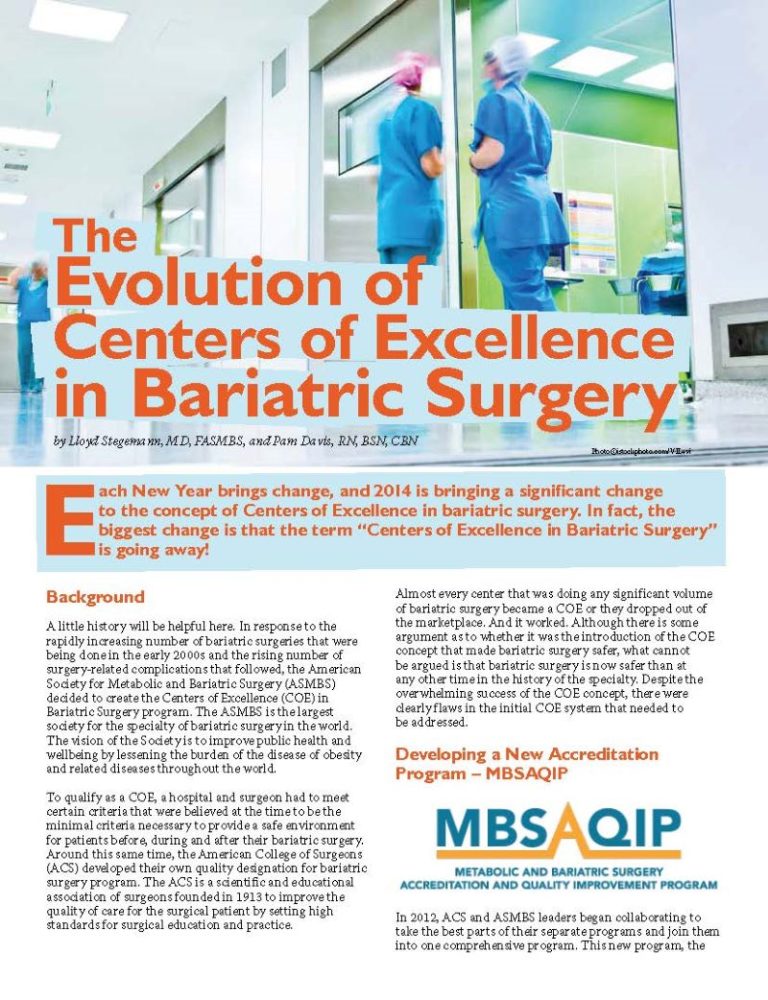The Evolution of Centers of Excellence in Bariatric Surgery


by Lloyd Stegemann, MD, FASMBS, and Pam Davis, RN, CBN, MBA
Winter 2014
Each New Year brings change, and 2014 is bringing a significant change to the concept of Centers of Excellence in bariatric surgery. In fact, the biggest change is that the term “Centers of Excellence in Bariatric Surgery” is going away!
Background
A little history will be helpful here. In response to the rapidly increasing number of bariatric surgeries that were being done in the early 2000s and the rising number of surgery-related complications that followed, the American Society for Metabolic and Bariatric Surgery (ASMBS) decided to create the Centers of Excellence (COE) in Bariatric Surgery program. The ASMBS is the largest society for the specialty of bariatric surgery in the world. The vision of the Society is to improve public health and wellbeing by lessening the burden of the disease of obesity and related diseases throughout the world.
To qualify as a COE, a hospital and surgeon had to meet certain criteria that were believed at the time to be the minimal criteria necessary to provide a safe environment for patients before, during and after their bariatric surgery. Around this same time, the American College of Surgeons (ACS) developed their own quality designation for bariatric surgery program. The ACS is a scientific and educational association of surgeons founded in 1913 to improve the quality of care for the surgical patient by setting high standards for surgical education and practice.
Almost every center that was doing any significant volume of bariatric surgery became a COE or they dropped out of the marketplace. And it worked. Although there is some argument as to whether it was the introduction of the COE concept that made bariatric surgery safer, what cannot be argued is that bariatric surgery is now safer than at any other time in the history of the specialty. Despite the overwhelming success of the COE concept, there were clearly flaws in the initial COE system that needed to be addressed.
Developing a New Accreditation Program – MBSAQIP

In 2012, ACS and ASMBS leaders began collaborating to take the best parts of their separate programs and join them into one comprehensive program. This new program, the Metabolic and Bariatric Surgery Accreditation and Quality Improvement Program (MBSAQIP), rolls out in 2014 and reflects the advancements made in the field of bariatric surgery throughout the last 10 years. Bariatric centers who meet all the criteria under the new program will no longer be designated a “Centers of Excellence in Bariatric Surgery,” but instead will receive the designation “Accredited in Bariatric Surgery.”
The new accreditation program still requires centers to have adequate resources in place to assure that bariatric surgery can be done in an environment that promotes a culture of safety both in and out of the operating room and treats bariatric patients with the dignity and respect they deserve. The new accreditation program also places a heavy emphasis on reporting of data to the MBSAQIP database, which will allow us to study bariatric surgery at an unprecedented level. The new accreditation program requires bariatric centers to self-monitor their program and develop quality improvement initiatives to constantly improve their processes and outcomes. Patients that go to an “Accredited Center in Bariatric Surgery” can be assured that the center is committed to their wellbeing and to the field of bariatric surgery.
What Does this Mean for You?
Accreditation is a valuable thing. It ensures you that a bariatric center, and its surgeons, have passed a certain level of criteria to practice bariatric surgery. However, this does not mean that this is the ONLY thing you need to consider when learning more about bariatric surgery. There are many other things to consider, and it’s very important to discuss surgery with your family members and loved ones. Below, we’ve assembled a list of questions you should consider when looking for a surgeon and bariatric center:
Questions for You
- What does it mean to be “Accredited in Bariatric Surgery”?
When a program is an MBSAQIP Accredited Center, it means they meet the minimum requirements as established by a joint effort between the ASMBS and ACS.
- How does that affect me as a patient?
When you have bariatric surgery, the primary goal is always your safety. By following all of the guidelines to become an accredited center, the surgeon and program demonstrate their commitment to your safety. This also includes delivering your care in a sensitive manner. Some examples are having hospital gowns and beds that are more accommodating, having dedicated staff in the operating room and on the nursing units and plans to follow-up with you long-term after your surgery.
- If accreditation is so important for patient safety and quality, then why would Medicare decide it’s not important and remove it as a coverage requirement?
That’s a toughie. It’s not necessarily that Medicare decided it’s not important. They made a decision in late-2013 to allow their members to have bariatric surgery at programs without Center of Excellence designation. That makes it even more important for you to educate yourself about choosing the right surgeon and the right program.
- How can I make sure the surgeon and program I choose are right for me?
Do your homework! Ask lots and lots of questions (see the offered list above), go to several seminars, visit their Web sites, speak with their patients either online or at support group, make sure it’s the right fit for you.
- Aren’t all surgeons good? I mean, if they weren’t, they wouldn’t be allowed to operate, right?
Think about bariatric surgeons, which are specialty surgeons, like you would a 3-in-1 printer (don’t get upset docs!). When you buy a 3-in-1 printer, one that scans, faxes and makes copies, it does everything satisfactory, but it doesn’t really excel at any one particular component. If you wanted to print super high quality digital photos, you wouldn’t choose a 3-in-1 printer as the best option. When you choose your surgeon, you want someone who performs a lot of bariatric surgery the majority of the time.
- Why do I need to worry about the “program” when the surgery is the risky part?
The procedure itself is the “riskiest” part; however, the surgery is only one small component of your overall success after surgery. Equally as important to your overall long-term success is the quality of support through your program. How often will you see the dietitian? Are they dedicated to bariatrics or is that only a very small portion of the patients they see? Will you have access to an exercise physiologist? How often? How frequently are support groups held? Who leads them? Does the program provide online support? How often are you expected to come in for follow-up visits? Who will you see?
- Is there some kind of checklist I can use to make sure my surgeon and program are good?
Begin with the questions listed in this article and then add the questions stated in the above bullet point.
- Is there some type of “seal of approval” I can look for?
The MBSAQIP Accredited Center designation is what you want to look for when choosing a bariatric center.
These questions are a great place to start when trying to identify a surgeon and practice you feel comfortable with. Once you find a surgeon that’s right for you, be sure to ask even more questions! At the top-right of this page, please find a list of questions you can ask your surgeon:
Questions for your Surgeon
- What procedures do you perform and why?
- How many of each procedure have you performed?
- What are the risks of surgery for me?
- What will my hospital stay be like?
- How frequently do your patients have to be readmitted to the hospital?
- What is the schedule for follow-up appointments?
- What will eating be like after surgery?
- How long will it be before I can have surgery?
- If my insurance doesn’t cover surgery or denies my request, do you have payment options available?
- What programs do you have in place to help me be successful long-term?
Conclusion
There’s an old saying in that “knowledge is power.” When it comes to choosing a treatment option, especially surgery, there is nothing more valuable than knowledge. As a patient, it is your responsibility to be as informed as possible. Ask questions, ask more questions, talk to friends, talk to family and when you’ve done all that, ask some more questions. Remember, YOU are the leader of your healthcare team!
About the Authors:
Lloyd Stegemann, MD, FASMBS, is a private practice bariatric surgeon in Corpus Christi, TX. He is the driving force behind the Texas Weight-loss Surgery Summit and the formation of the Texas Association of Bariatric Surgeons. Dr. Stegemann is a member of the American Society for Metabolic and Bariatric Surgery, OAC National Board of Directors, Co-chair of the Convention Program Agenda Subcommittee and is Chair of the OAC Sponsored Membership Program.
Pam Davis, RN, CBN, BSN, is a certified bariatric nurse and the Program Director for Centennial Center for the Treatment of Obesity in Nashville and Immediate-Past Chairman of the OAC National Board of Directors. Pam serves on the Integrated Health Executive Council and chairs the Integrated Health Clinical Issues and Guidelines Committee of the ASBMS and is the current president of the Eating Disorders Coalition of Tennessee. Through her work at Centennial, Pam strives to educate employers and physicians on obesity prevention and treatment.
by Kendall Griffey, OAC Communications Manager Spring 2024 We have officially kicked off Your Weight Matters Regional…
Read Articleby OAC Staff Members Kendall Griffey and Michelle “Shelly” Vicari Winter 2024 In a world that often…
Read Articleby Rachel Engelhart, RD; Kelly Donahue, PhD; and Renu Mansukhani, MD Summer 2023 Welcome to the first…
Read Article









